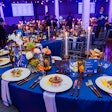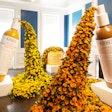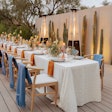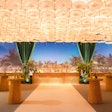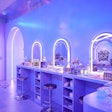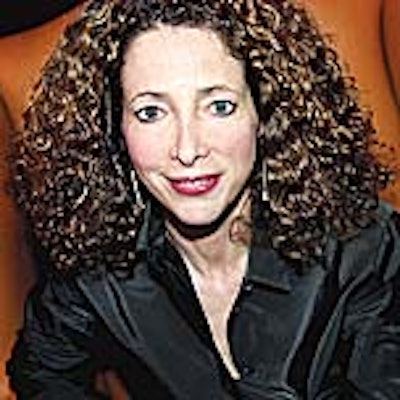
Title: President
What she plans: This year she produced 18 trade shows, including September's ENK International Fashion Coterie show, which attracted more than 12,000 attendees—that's almost a third more than last year. Next year she'll add five Los Angeles shows, and her total count could go as high as 28—double the number of shows she did in 2002. She also leased Pier 94 from the city, making her the landlord for a host of other events.
Staff: 25
Budget: She won't say.
Career path: Graduated from Cornell University with a degree in design and environmental analysis, and then did PR for almost three years for fashion industry dynamo Gabriella Forte. Kroll then started producing her own trade shows and, ultimately, founded ENK—using her initials—20 years ago.
Age: "That's a question I've always been adverse to answering. And I was saying that when I was 25."
Favorite hors d'oeuvres: "Something I did recently, which I thought was pretty fabulous, was a mashed potato bar with martini glasses and different toppings like parmesan and butter."
Favorite magazine: Influential 1950's magazine Flair
Where she goes for ideas: "When I travel, something always jumps in my brain. And I have a really cool staff."
Where she grew up: Born in Manhattan, lived in Syracuse and Long Island
Where she lives: The East 50'sHow has the economy affected your events this year?
In the trade show world, I don't think I necessarily follow the same template as everyone else. I have always felt that we do well in a recession and do well when the economy is strong because people need trade shows at both times. When it's bad, you need to be there to show that you're alive and well, and when business is good, you want bigger, better business from attending.
This year the shows picked up again. If the economy ever affects a show, it could be that a company will take a smaller booth. But I didn't even see that. Then again, in fashion, if a store doesn't have fresh merchandise, what’s the point?
How do you make an event effective when budgets are going down?
We do what's necessary. I can't look at a budget and say, “OK, this item just costs too much.” If I think it's essential, we’re going to do it.
What do attendees expect at one of your events?
I create an atmosphere that people want to be a part of and when they get there, don't want to leave. It's not without the human touch.
How are expectations changing?
I think that there's a different kind of competition in life right now. Everyone is upping the service, so it's more inclusive, more like onestop shopping. I don't think that attendees' expectations are changing—I think the expectations of trade show producers and event planners are changing because of competition. Everyone is trying to figure out the next greatest thing to do. Look at Kentucky Fried Chicken. All of a sudden they have kids' meals— how many years did it take to come up with that one? Everyone is upping the ante and attendees are benefiting.
How do you keep yourself engaged in your work?
I just love what I do. My shows show that. I'm particular about how things look and feel. I'm a pain in the ass when I go to a restaurant. No matter where I go, I'm like a big, critical pain in the ass. That's what I do. I’m always criticizing and critiquing—when I should and when I shouldn't. It’s just my nature and I found a business that really works better because of it.
How has your job changed this year?
We now are landlords of one of the biggest venues in New York, Pier 94. The reason I went vertical in my business is because I couldn't find the proper venue and we were calling it "the unconvention center" because we're trying to be unconventional. I want to treat our other show producers who book space there in a way they haven't been treated before.
How do you convince others that trade shows are still important?
No matter who you speak to, it's an obvious fact: You're going to get far more foot traffic in the course of three days at a show than you're going to get in a showroom. So whatever pittance it costs to show up, you should show up.
What trends are you seeing in event style?
For us, we're trying to project a lifestyle. We really had to step up to the plate and start looking better than we did every year before. Now we look really hip.
How do you measure a show's success?
What we did at the ENK International Fashion Coterie, creating lounges that sort of mix business and pleasure, was a tremendous success. It's not so much dollar figures as much as buzz.
What's your budget challenge right now?
When you have a lot of start-up shows, it's a lot of investment. [About 10 percent of ENK’s business is now shows.] They certainly don't make money for quite some time. You just have to keep pouring it in and when eventually it starts to pay off.
How has technology affected the way you plan events?
We live and die by a software package, which was created for us, that tracks players in our business. And at out trade shows we started offering a place for attendees to check their email during the show and process orders.
—Michele Marchetti
What she plans: This year she produced 18 trade shows, including September's ENK International Fashion Coterie show, which attracted more than 12,000 attendees—that's almost a third more than last year. Next year she'll add five Los Angeles shows, and her total count could go as high as 28—double the number of shows she did in 2002. She also leased Pier 94 from the city, making her the landlord for a host of other events.
Staff: 25
Budget: She won't say.
Career path: Graduated from Cornell University with a degree in design and environmental analysis, and then did PR for almost three years for fashion industry dynamo Gabriella Forte. Kroll then started producing her own trade shows and, ultimately, founded ENK—using her initials—20 years ago.
Age: "That's a question I've always been adverse to answering. And I was saying that when I was 25."
Favorite hors d'oeuvres: "Something I did recently, which I thought was pretty fabulous, was a mashed potato bar with martini glasses and different toppings like parmesan and butter."
Favorite magazine: Influential 1950's magazine Flair
Where she goes for ideas: "When I travel, something always jumps in my brain. And I have a really cool staff."
Where she grew up: Born in Manhattan, lived in Syracuse and Long Island
Where she lives: The East 50'sHow has the economy affected your events this year?
In the trade show world, I don't think I necessarily follow the same template as everyone else. I have always felt that we do well in a recession and do well when the economy is strong because people need trade shows at both times. When it's bad, you need to be there to show that you're alive and well, and when business is good, you want bigger, better business from attending.
This year the shows picked up again. If the economy ever affects a show, it could be that a company will take a smaller booth. But I didn't even see that. Then again, in fashion, if a store doesn't have fresh merchandise, what’s the point?
How do you make an event effective when budgets are going down?
We do what's necessary. I can't look at a budget and say, “OK, this item just costs too much.” If I think it's essential, we’re going to do it.
What do attendees expect at one of your events?
I create an atmosphere that people want to be a part of and when they get there, don't want to leave. It's not without the human touch.
How are expectations changing?
I think that there's a different kind of competition in life right now. Everyone is upping the service, so it's more inclusive, more like onestop shopping. I don't think that attendees' expectations are changing—I think the expectations of trade show producers and event planners are changing because of competition. Everyone is trying to figure out the next greatest thing to do. Look at Kentucky Fried Chicken. All of a sudden they have kids' meals— how many years did it take to come up with that one? Everyone is upping the ante and attendees are benefiting.
How do you keep yourself engaged in your work?
I just love what I do. My shows show that. I'm particular about how things look and feel. I'm a pain in the ass when I go to a restaurant. No matter where I go, I'm like a big, critical pain in the ass. That's what I do. I’m always criticizing and critiquing—when I should and when I shouldn't. It’s just my nature and I found a business that really works better because of it.
How has your job changed this year?
We now are landlords of one of the biggest venues in New York, Pier 94. The reason I went vertical in my business is because I couldn't find the proper venue and we were calling it "the unconvention center" because we're trying to be unconventional. I want to treat our other show producers who book space there in a way they haven't been treated before.
How do you convince others that trade shows are still important?
No matter who you speak to, it's an obvious fact: You're going to get far more foot traffic in the course of three days at a show than you're going to get in a showroom. So whatever pittance it costs to show up, you should show up.
What trends are you seeing in event style?
For us, we're trying to project a lifestyle. We really had to step up to the plate and start looking better than we did every year before. Now we look really hip.
How do you measure a show's success?
What we did at the ENK International Fashion Coterie, creating lounges that sort of mix business and pleasure, was a tremendous success. It's not so much dollar figures as much as buzz.
What's your budget challenge right now?
When you have a lot of start-up shows, it's a lot of investment. [About 10 percent of ENK’s business is now shows.] They certainly don't make money for quite some time. You just have to keep pouring it in and when eventually it starts to pay off.
How has technology affected the way you plan events?
We live and die by a software package, which was created for us, that tracks players in our business. And at out trade shows we started offering a place for attendees to check their email during the show and process orders.
—Michele Marchetti















